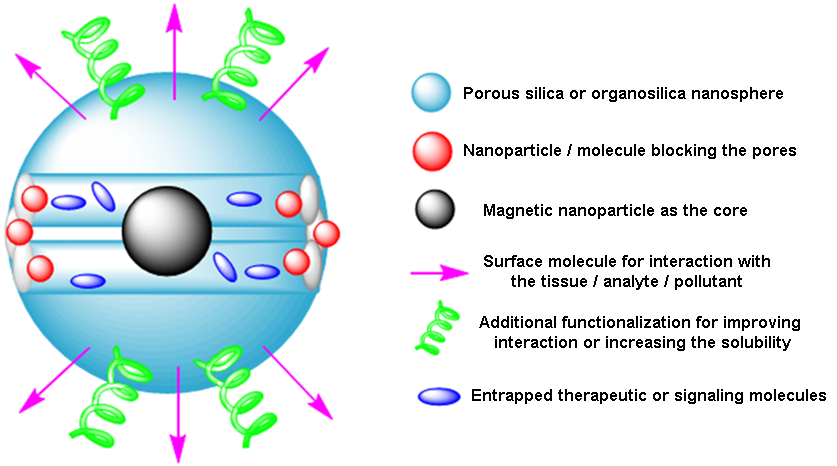Silica nanomaterials
Due to their small diameter (ca. 100 nm) and highly porous nature, mesoporous silica nanoparticles (MSNs) have high specific surface area (ca. 1000 m2/g) which can be utilized for a plethora of functionalizations, loading/adsorption of different molecules and their removal, or as a platform for signaling molecules to detect different analytes.
Mesoporous organosilicate nanomaterial (also termed Periodic Mesoporous Organosilica (PMO)) contains a large percentage of organic groups within the nanosphere, exhibiting unique characteristics for different applications.
Our research is being conducted toward design of new series of MSN and PMO nanomaterials, as well as their core/shell analogs.
Surface of these nanomaterials is being modified with different molecules to specifically interact with desired tissues, pollutants, or analytes, for their efficient application in monitoring and protection of health, food and the environment.
One of the research goals is to develop smart nanomaterials with stimuli-responsive release of MSN/PMO-loaded molecules for diagnostics, imaging, and therapy of cancer tissues.
Polymer-MSN composite materials are also being developed for applications as antimicrobial smart food packaging and medical implants.
Finally, PMO nanoparticles are being constructed for efficient UVA and UVB blocking and application in a safer generation of sunscreens.

Projects:
PRECAST: Prediction of Cancer Treatment Effectiveness with Stimuli-responsive Nanomaterials, Science Fund of the Republic of Serbia
Novel Active Components for Health- and Environment-friendly UV-Blocking Based on Enriched Organosilica Nanomaterials, Project ID: 5566, The Innovation Fund of the Republic of Serbia
III 44006, Ministry of Education, Science, and Technological Development of the Republic of Serbia.